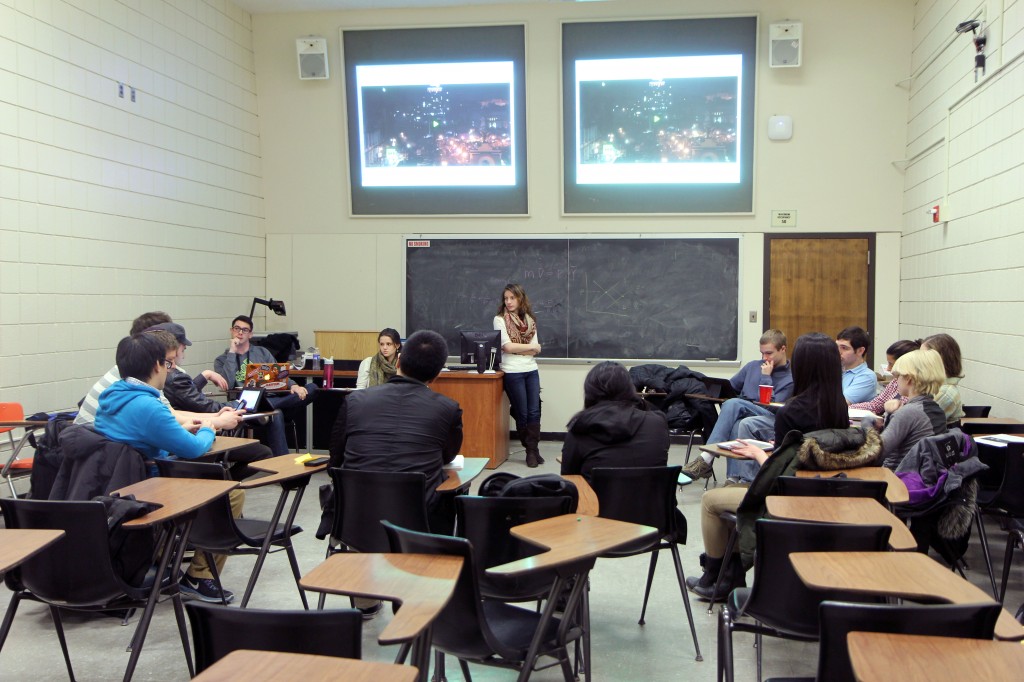
As the anti-government protests in Ukraine persist, Binghamton University’s Dorm Room Diplomacy (DRD) gathered for a roundtable discussion on the politics, international affairs and violence surrounding the protests.
Ukranian demonstrators are protesting the decisions made by President Viktor Yanukovych. Since November of last year, the protests have elicited violent responses and a rising death toll.
Protests began in November when Yanukovych reversed a decision regarding a trade deal with the European Union, choosing stronger connections with Russia instead of of the EU.
Hosted by DRD, Thursday night’s event opened discussion for students who had opinions on the violence.
Ukraine’s government is under a semi-presidential system made up of several branches of government. The question of whether or not Ukraine is a dictatorship was met with differing opinions. Jordan Clifford, a senior majoring in political science, spoke on the topic of fairness of elections in Ukraine.
“Although they do have elections, they’re not fair or free,” Clifford said. “There’s a lot of interference by the government.”
Other participants argued that establishment of anti-protest laws in Ukraine are suppressing the voice of the people in such a way that makes them seem like more of a dictatorship.
According to some of the event’s participants, some of the police have surrendered their weapons and even joined the protesters.
The Yanukovych regime is quite dependent upon the “Berkut” special forces, troops that are part of the Ministry of Internal Affairs. They are specially trained to silence much of the revolt, and have been noted for their particularly brutal treatment to protesters. Otherwise, much of the army has abandoned their allegiance to Yanukovych. Participants commented on the brutalities, speaking on whether involvement from other nations would be helpful and how the Ukrainian government should respond.
According to Clifford, one of Yanukovych’s first mistakes was using this sort of violence against the protesters.
“The regime is not allowing political inclusion. The economy isn’t dwindling, it’s okay. But unemployment is rampant everywhere,” Clifford said. “These are the circumstances … that initiate the protests, that keep it going, that keep people on the street there, that initiate these grievances. The repression … then brought the violence, which then enabled the people to use the violence against the government.”
Dorothy Manevich, the president of DRD and a senior triple-majoring in history, political science and French, opened discussion on whether or not the U.S. and the EU should be involved in the situation in Ukraine. Students like Evgeny Sedashov, a graduate student studying political science, spoke on international involvement.
“I don’t think that the problem is Ukraine itself,” Sedashov said. “It’s Russia … and what the European Union and the U.S. is doing in Ukraine at the same time. That’s what’s going on.”
While the protests carry on, the people of Ukraine continue to demand greater rights and truth from the government. Manevich proceeded to show a video of a protester in Kiev, the capital of Ukraine, urging viewers to give their attention to the protests.
Rachel Appel, a senior double-majoring in management and political science, expressed concern for the protesters in Ukraine.
“I feel really lucky to live in a country where freedom of expression is highly valued, and a central tenant of our society,” Appel said. “I can’t imagine how scary it must be for the protesters who are risking their lives to stand up for what they believe in.”


